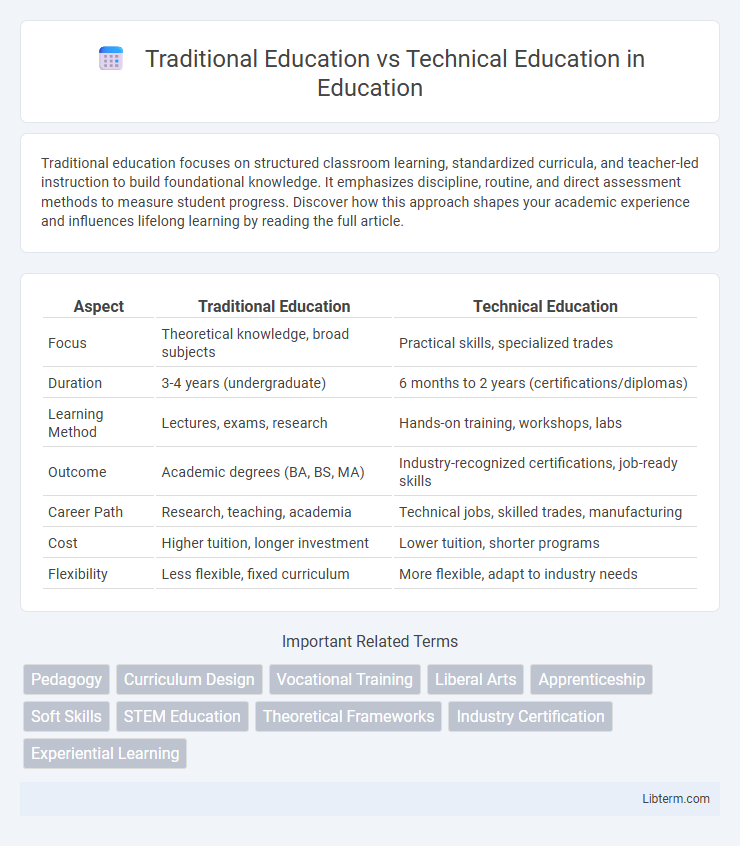Traditional education focuses on structured classroom learning, standardized curricula, and teacher-led instruction to build foundational knowledge. It emphasizes discipline, routine, and direct assessment methods to measure student progress. Discover how this approach shapes your academic experience and influences lifelong learning by reading the full article.
Table of Comparison
| Aspect | Traditional Education | Technical Education |
|---|---|---|
| Focus | Theoretical knowledge, broad subjects | Practical skills, specialized trades |
| Duration | 3-4 years (undergraduate) | 6 months to 2 years (certifications/diplomas) |
| Learning Method | Lectures, exams, research | Hands-on training, workshops, labs |
| Outcome | Academic degrees (BA, BS, MA) | Industry-recognized certifications, job-ready skills |
| Career Path | Research, teaching, academia | Technical jobs, skilled trades, manufacturing |
| Cost | Higher tuition, longer investment | Lower tuition, shorter programs |
| Flexibility | Less flexible, fixed curriculum | More flexible, adapt to industry needs |
Introduction to Traditional and Technical Education
Traditional education emphasizes foundational knowledge through structured curricula in subjects like literature, history, and mathematics, fostering critical thinking and broad intellectual development. Technical education focuses on practical skills and industry-specific training, preparing students for immediate employment in fields such as engineering, information technology, and skilled trades. Both approaches serve distinct purposes by combining theoretical learning with hands-on experience to meet diverse educational and workforce needs.
Defining Traditional Education
Traditional education emphasizes structured learning through established curricula, typically within classroom settings focusing on theoretical knowledge and foundational subjects like math, science, and literature. It prioritizes critical thinking, holistic development, and social interactions through teacher-led instruction and standardized assessments. This model often values discipline, memorization, and time-tested pedagogical methods as core components of student growth.
What is Technical Education?
Technical education focuses on imparting practical skills and specialized knowledge directly applicable to specific trades or industries, such as engineering, information technology, or healthcare. It emphasizes hands-on training, competency-based learning, and the use of modern technology to prepare students for immediate employment and career advancement. Unlike traditional education, which often centers on theoretical concepts and broad academic subjects, technical education is designed to meet the demands of the labor market and foster technical proficiency.
Key Differences Between Traditional and Technical Education
Traditional education emphasizes broad theoretical knowledge across multiple disciplines with a focus on critical thinking and general literacy, while technical education centers on hands-on skills and practical training tailored to specific industries such as information technology, engineering, or healthcare. Traditional education typically involves longer durations and leads to degrees like bachelor's or master's, whereas technical education offers shorter, certification-based programs aimed at immediate workforce entry. Assessment methods in traditional education often rely on exams and essays, in contrast to technical education which evaluates proficiency through practical projects and skill demonstrations.
Advantages of Traditional Education
Traditional education fosters critical thinking and a broad knowledge base through structured curricula rooted in classical disciplines. It emphasizes foundational skills such as literacy, numeracy, and humanities, which are essential for cognitive development and cultural awareness. This type of education also promotes social skills and discipline through classroom interaction and long-established pedagogical methods.
Benefits of Technical Education
Technical education equips students with practical skills and hands-on experience directly applicable to specific industries, enhancing job readiness and employability. It fosters innovation and problem-solving abilities by emphasizing real-world applications and technology-driven learning. Graduates of technical programs often experience faster career advancement and higher earning potential due to specialized expertise in fields like engineering, information technology, and healthcare.
Career Prospects: Traditional vs Technical Paths
Traditional education often emphasizes theoretical knowledge and broad foundational skills, preparing students for careers in academia, law, medicine, or business management. Technical education focuses on specialized, hands-on training in fields like information technology, engineering, healthcare technology, and skilled trades, leading to quicker entry into the workforce with practical skills. Career prospects in technical paths typically show faster employment rates and competitive salaries in industries experiencing rapid technological growth.
Skills Developed in Each Educational Approach
Traditional education emphasizes foundational knowledge, critical thinking, and theoretical understanding through structured curricula in subjects like literature, history, and mathematics. Technical education focuses on practical, hands-on skills such as programming, machinery operation, and applied sciences that directly align with industry requirements. Skills developed in technical education typically include problem-solving in real-world contexts, technical proficiency, and adaptability to technological advancements, while traditional education fosters analytical reasoning and broad intellectual development.
Challenges Faced by Both Education Systems
Traditional education faces challenges such as outdated curricula that may not align with current job market demands and limited hands-on experience for students. Technical education struggles with rapid technological advancements that require constant updating of equipment and skills, often leading to resource constraints in institutions. Both systems must address gaps in practical skill development and adaptability to prepare learners effectively for evolving career landscapes.
Which Education System is Right for You?
Choosing between traditional education and technical education depends on your career goals, learning style, and industry demands. Traditional education offers broad theoretical knowledge and critical thinking skills, ideal for careers requiring extensive academic backgrounds, while technical education provides hands-on training and practical skills tailored to specific trades or technologies, facilitating faster entry into the workforce. Evaluate your personal strengths and job market trends to determine which system aligns best with your future ambitions.
Traditional Education Infographic

 libterm.com
libterm.com